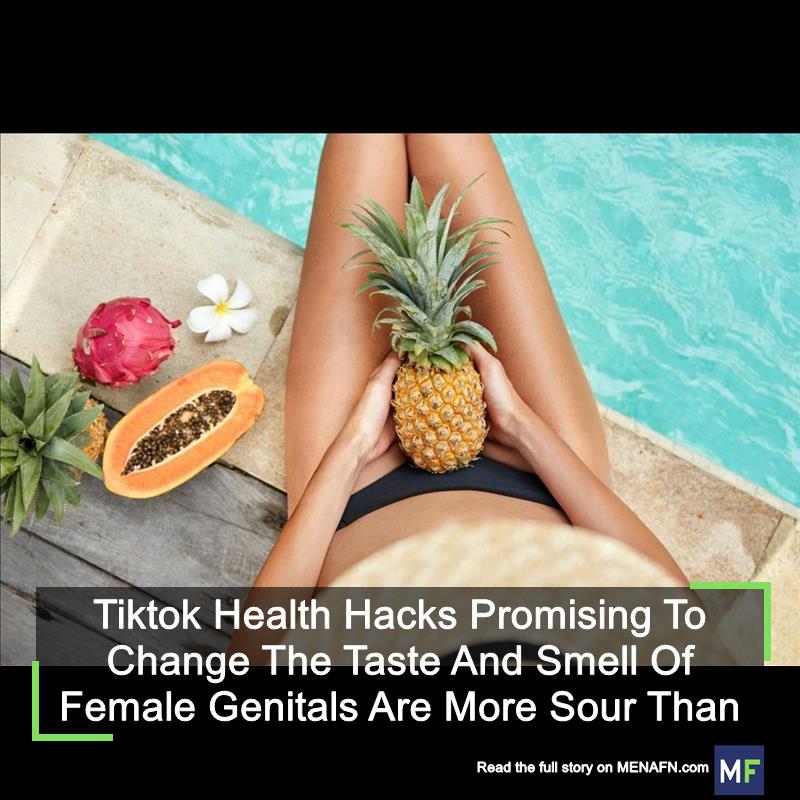
Tiktok Health Hacks Promising To Change The Taste And Smell Of Female Genitals Are More Sour Than Sweet
That's the advice from the latest viral trend on TikTok claiming to help women alter the smell and taste of their vulva and vagina.
A wave of short videos on the social media platform suggest strategies, including consuming large amounts of pineapple and banana, to make vaginas smell and taste sweeter.
One video suggests a home-brewed pineapple concoction taken three times daily for“vagina cleansing” and to make the vulva“smell good” will have benefits such as a“tighter”,“sweeter” vagina.
But what are we to make of these claims? Is“coochie juice” beneficial for women's intimate health or is this a potentially harmful trend?
The social media videos cite various reasons for consuming pineapple for intimate hygiene.
These include claims that the bromelain and vitamins contained in pineapples, their high natural sugar content and acidity will improve the smell or taste of the vulva.
There is some evidence that diet can influence body odour, but only as far as male sweat is concerned. There is no evidence that eating large amounts of fruits like pineapple or banana will significantly change the smell or taste of a vulva.
Products claiming to change the taste and smell of the vagina and vulva are usually given short shrift by medical professionals.
Some prominent gynaecologists and experts have challenged this fruity hack because part of the natural scent of the vulva is caused by healthy bacteria called lactobacilli. Ultimately, this hack is backed only by anecdotal evidence.
The TikTok health hack landscape is varied. Many videos suggest consuming pineapple as an alternative to known harmful practices, such as vaginal douching , while other educated professionals create myth-busting content around the topic, such as this response video .
However, we should be paying attention to the way information about health and our bodies is spread on social media, as it can lack important information.
The quick and snappy content TikTok pioneers may lack the necessary nuance needed to talk about health and the nature of evidence.
One example, from an influencer who sells a variety of homemade organic enhancement treatments related to women's insecurities – and who has 225,000 TikTok followers – demonstrates this. In her nine-second video, she dances while holding a pineapple, and urges followers to:“Stop using intimate wash for a clean vagina. Try pineapple juice to clear all fishy smells in your cookie.”
However, in several comments, viewers ask“how”, as the video doesn't specify if pineapple should be taken orally or applied to the area. This shows the problems that can be created when influencers try to create the short content favoured by the TikTok algorithms and miss important clarifications or evidence to support their claims.
Why are fruit vagina hacks so popular?So why does content like this vulva hack go viral?
In the fast-paced world of social media, content creators are constantly under pressure to stay visible and keep their content popping up on your feed. This digital rat race, driven by complex algorithms that decide what you see, forces them to keep producing new material.
The catch?
They might find themselves scraping the bottom of the barrel for ideas, jumping onto any passing trend, even if it is questionable.
Kourtney Kardashian's vaginal health gummies were heavily criticised by medical professionals in 2023 but still went viral on social media.
The quest to stay relevant in an environment where being visible is essential, pushes influencers to create constant content, sometimes at the cost of quality and accuracy.
Across the social media sphere, the line between genuine health advice and misleading information is increasingly blurry.
Content creators claiming to be experts can misrepresent their knowledge, often by blurring the boundaries between science and pseudoscience.
In the case of the pineapple hack, we can see holistic and herbalist influencers using these tactics to boost their own credibility while casting doubt on conventional medicine.
This muddies the waters for the audience, making it difficult to distinguish fact from fiction and potentially breeding long-term scepticism of proven scientific methods in healthcare in their audiences.
Although social media can be a valuable space offering a wealth of benefits, including increased health awareness and peer support, it's crucial to remain vigilant about its potential harms.
One such harm can be found at the heart of this particular TikTok trend. By perpetuating stereotyped societal messages that vulvas are unpleasant and have a bad smell, trends like the pineapple hack risk creating paranoia and body image issues for those who have a vagina.
Suggesting that the natural biology of genitals be“hacked” fuels unrealistic expectations of the appearance and smell of vulvas and ignores the diversity and complexity of women's bodies.
The trend, although seemingly jovial and harmless, reinforces a narrow and harmful view of female anatomy, which could lead to the pursuit of unhealthy practices.
Given the flurry of viral health trends, it's essential to look at the information we consume on social media with a critical eye, especially when they may affect our health and wellbeing, and understand the importance of evidence in making informed health decisions.

Legal Disclaimer:
MENAFN provides the
information “as is” without warranty of any kind. We do not accept
any responsibility or liability for the accuracy, content, images,
videos, licenses, completeness, legality, or reliability of the information
contained in this article. If you have any complaints or copyright
issues related to this article, kindly contact the provider above.


















Comments
No comment